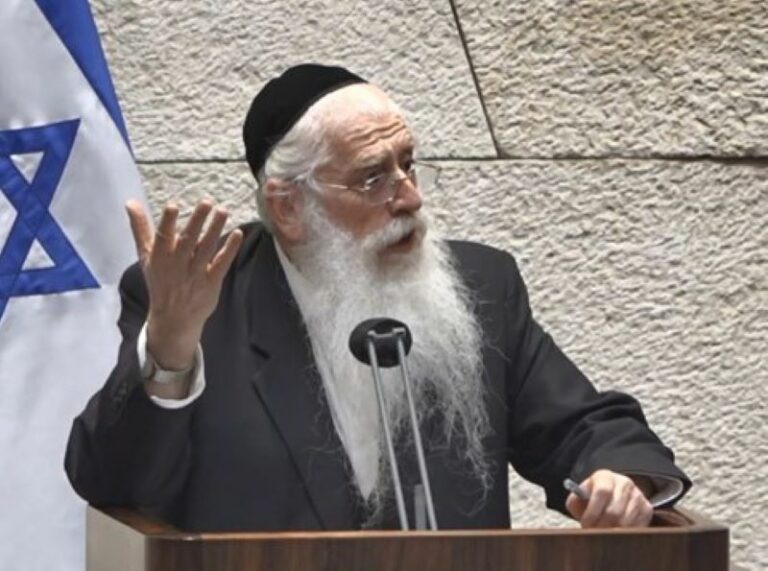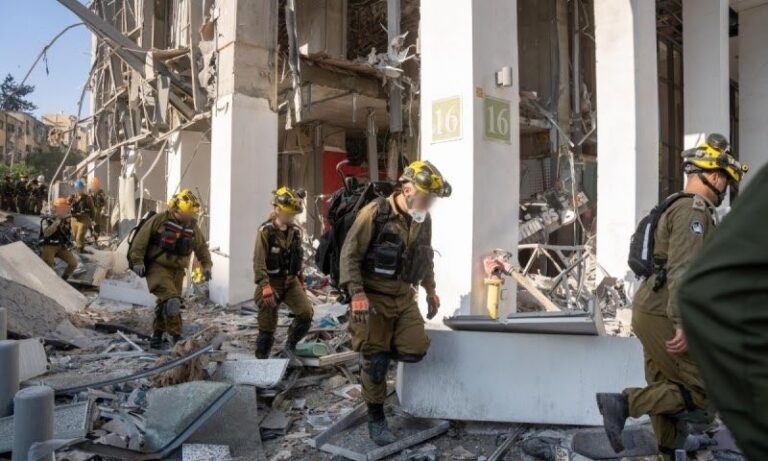
Rabbi Elie Estrin, who together with his wife Chaya, is the director of the Rohr Chabad House for Jewish Life at the University of Washington in Seattle, graduated this Monday from Officer Training School at the Maxwell Air Force base in Montgomery, Alabama. Estrin, who now holds the rank of Captain, is the first bearded officer in the United States Air Force.
During the entire five week Commissioned Officer Training Course, Rabbi Estrin was forced to eat Kosher MRE’s (ready-to-eat meals) but said that staff were fantastic about facilitating his required accommodations, some of which included his adherence to Shabbat and the 25 hour fast of “Tisha Be’av”, a day which commemorates the destruction of the second temple in Jerusalem.
The 5 am wake-ups every morning for PT were definitely “different” for Estrin, 35, as was the incessant push-ups and sit-ups, and the 1.5 mile running PT test, but for the father of five, the road to the armed services was “a logical extension of his existing service to the Jewish community”.
In his 11 years serving the Jewish student community at the University of Washington, Estrin notes that out of the many students with whom he an his wife had a close rapport with, more than a dozen had gone on to join the military. And, after speaking with an alumnus who had served with the prestigious U.S. Army Rangers, he became convinced that chaplaincy was an ideal fit.
In January of 2014, the military ban on wearing a beard and other such displays of religious belief, was lifted by the Pentagon, paving the way for Rabbi Estrin to join the military chaplaincy.
The stop in Alabama is part of a seven thousand mile road-trip Rabbi Estrin, Chaya, and their 5 children have embarked on, making their way through 23 States. They began their journey on June 11th in the Chabad on Campus RV, known as the “Mitzvah Tank”, which is generally used to service students in the outlying areas of WU’s vast campus. The Estrin’s traveled cross-country to attend the Chabad on Campus Director’s Conference in Stamford, CT, and are currently making their way back home through the southern States.
Chabad on Campus has experienced tremendous growth since the year 2000, expanding from 77 Jewish centers, to their current status of over 230 full-time, professionally staffed centers, becoming the largest network of professional Jewish educators, serving the needs of Jewish student populations on campuses around the world.
Rabbi Elie Estrin said, “The AF leadership training was exceptional, and I believe it will assist me in my work both on campus and as an Air Force chaplain. I’m looking forward to getting back to work and applying it all in the real world.”


(YWN World Headquarters – NYC)











3 Responses
Chabad is doing a Great Mitzvah saving jews from Assimilation. I remember when I went to Mc Gill University Chabad House met students from the USA ONE of them told me
last time he was in Shul at his Bar Mitzva,and they took a
Sefer Torah on Shabbos by car.A year later he became Shomer
Shabbat and married a religeous girl.
If not for Chabad these guys would have all married non jews. .
Nice, but the real issue should be whether religious Jews will be fully accomodated in the uniform services. While some very modern Orthodox types with very liberal interpretations of halacha (often based on halachic heterim expressed when Jews were serving in the various anti-semitic armies in Europe 100 years ago – and any refusal of orders led to a firing squad rather than a discharge) do manage to serve (especially as medical corps officers), most frum Jews will “flunk out” almost immediately when they refuse to do work on Shabbos.
There will be inherent problems have frum chaplains, but very few frum soldiers.
@Akuperma – As a Chareidi/Yeshivishe U.S. Air Force officer, I can tell you that while it’s very difficult, it’s not impossible. Yes, I have to rely on heterim, but I never rely on anything that I haven’t vetted through my (very Chareidi/Yeshivish) Rav and Rebbi. The two main things to do is 1) Make sure that everyone knows who you are before you get there and what you need, and 2) Get a job that very rarely (if ever) requires real, true work on Shabbos. My normal job (once I finished training) is a Monday-Friday job which allows me time to get home for Shabbos. Yes, I may get there with less than 30 minutes to lichtzen, but I’ve never gotten home late. I also live on base to shorten my commute.
I’m sure Rabbi Estrin will do great things, even if he’s only a reservist. I agree that there’s definitely more the military could do to accommodate religious Jews, but the religious Jew also has to go in knowing that unlike 50 years ago, no one’s “out to get you” anymore, and the more open you are, the easier it’ll be.